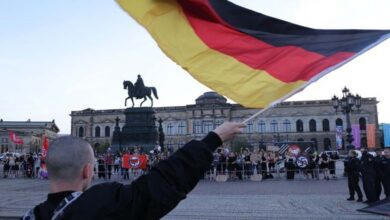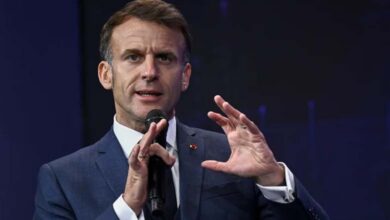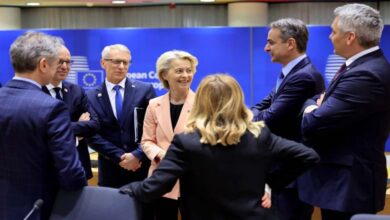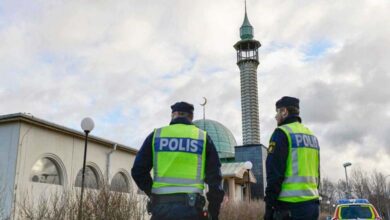Muslim Interaktiv: Germany Dismantles the Digital Face of the Muslim Brotherhood
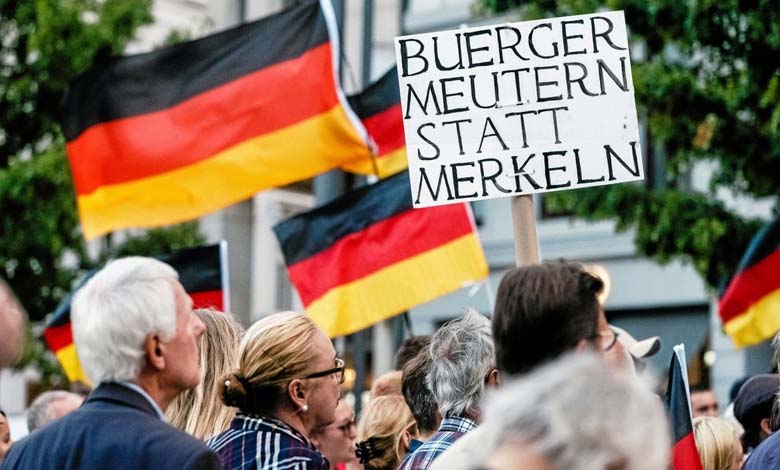
What unfolded on the streets of Hamburg was not a mere display of religious zeal, but a troubling manifestation of extremism — faces tense with fervor, voices echoing the slogans of the Muslim Brotherhood. For German authorities, this was not a spectacle to tolerate, but a threat that demanded confrontation.
-
One of the key religious leaders of the Muslim Brotherhood in Germany and Europe… What do you know about Taha Sulaiman Amer?
-
One of the prominent intellectual references for the Muslim Brotherhood in Germany and Europe… What do you know about the Tunisian Hadi Brik?
The rally organized last year by the Muslim Interaktiv association, where participants carried banners proclaiming “The Caliphate is the Solution” and marched in a militarized manner, became the catalyst for Germany’s decision to act.
On Wednesday, the Interior Ministry announced a nationwide ban on Muslim Interaktiv, striking a major blow against a network that had used the Internet as a tool for recruitment and mobilization.
Interior Minister Alexander Dobrindt declared in his statement: “We will not allow organizations like Muslim Interaktiv to undermine our free society with their hatred, to show contempt for our democracy, and to attack our country from within.”
-
A press report reveals details of a bill to blockade the Brotherhood in Germany
-
Germany Bans a Pro–Muslim Brotherhood Association and Raids Two Others
The ministry explained that the association’s objectives and activities were incompatible with Germany’s constitutional order and with the principles of international understanding.
Muslim Interaktiv represents a new generation of Brotherhood-inspired organizations, focused on digital outreach and youth engagement.
Based mainly in Hamburg but also active in Berlin, the group emerged in 2020 and has since united young migrants and German-born citizens of immigrant backgrounds, transforming online activism into street movements.
-
Muslim Interaktiv: Germany Dismantles the Digital Face of the Muslim Brotherhood
-
Honoring a Muslim Brotherhood-linked imam sparks a storm of criticism in Germany
A modern image of extremism
Members of the group often wear matching black clothing and caps bearing the group’s logo. Since its inception, Muslim Interaktiv has produced highly polished videos portraying Muslims as victims of persecution, a narrative used to gain sympathy and attract followers.
Germany’s domestic intelligence agency in Hamburg links the group ideologically to Hizb ut-Tahrir, a party banned in Germany since 2003 for advocating the use of force to achieve political aims.
-
From Turkey to Germany: how the Muslim Brotherhood manages its funds in Europe
-
Germany’s Muslim Brotherhood between delayed ban and soft confrontation: Is the European equation about to change?
Online, Muslim Interaktiv describes itself as a movement of “political activists” and rejects any association with “political Islam” or extremism, while employing rhetoric and strategies typical of Brotherhood affiliates. Like other similar groups, it avoids open affiliation and operates through covert ideological influence.
The group’s leader, Joe Addadi Boateng — who calls himself Rahim Boateng — is a student at the University of Hamburg training to become a teacher. However, he is also a vocal Islamist influencer on Instagram and TikTok, addressing discrimination against Muslims in Germany.
The organization maintains a strong online presence across platforms such as X, Facebook, TikTok, and YouTube, gathering thousands of followers and millions of views on professionally edited videos.
-
Action Plan in Germany: A New Path to Counter the Muslim Brotherhood
-
Silent Infiltration Through 50 Centers… This Is How the Muslim Brotherhood Operates in Germany
A growing movement under scrutiny
According to Die Welt, Boateng and Muslim Interaktiv have capitalized on the war in Gaza to accuse German politicians of being complicit in the killing of Palestinian civilians. This narrative, emotionally charged and politically framed, has significantly expanded their following — including a growing number of women.
The group’s demonstrations have grown rapidly: from only about 20 participants in 2020–2021 to 160 in early 2022, 3,500 in 2023, and a massive march in Essen later that year that alarmed both politicians and security agencies.
-
The Muslim Brotherhood Network in Germany: Organizations and Operational Mechanisms
-
Germany… Is the End of the Muslim Brotherhood Near?
Marco Haase, spokesperson for the domestic intelligence service, explained that Muslim Interaktiv exploits current events — from racist attacks to public debates — as opportunities for radicalization and recruitment.
Online, the group frequently denounces what it calls Germany’s “dictatorship of values” and “forced assimilation,” urging young Muslims to “break free.” This narrative resonates strongly with youth who feel alienated or culturally displaced.
-
Report Warns: Muslim Brotherhood Maneuvers in Germany to Infiltrate Society and Expand Its Activities
-
ISIS and the Muslim Brotherhood under surveillance: Political Islam worries Germany
Unlike traditional Islamist movements, Muslim Interaktiv presents itself with a modern aesthetic — no long beards or robes, but hoodies, baseball caps, and expensive cars.
According to Der Spiegel, the group deliberately mirrors the strategies of Europe’s far-right identity movements, turning cultural grievances into a tool for ideological mobilization. It represents, in essence, a new generation of radicals — digitally savvy, socially integrated, and ideologically driven.


